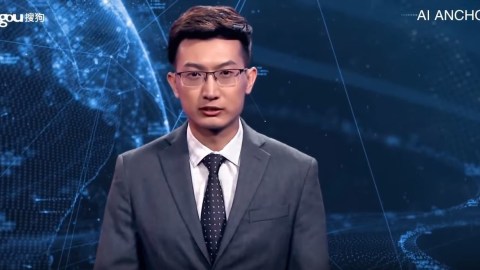Watch: China unveils the world’s first A.I. news anchor

Sogou-Xinhua
- The A.I. anchor was based off of a real-life anchor and is able to read any text it’s given.
- It looks realistic, but its movements are slightly awkward while speaking.
- The developers suggest the technology could someday be used for other purposes besides journalism.
The newest anchor at China’s Xinhua News Agency looks and talks like a human, but is in fact an A.I. that can report the news “tirelessly” 24 hours a day.
Developed by the state-run agency and the search engine company Sogou, the artificial anchor made its debut on November 7 at China’s annual World Internet Conference.
“Not only can I accompany you 24 hours a day, 365 days a year, I can be endlessly copied and present at different scenes to bring you the news,” the A.I., whose appearance is based off of a real news anchor at the agency, said.
“I, who was wholly cloned from a real-life host, have mastered broadcasting as well as the real host. As long as I am provided with text, I can speak as a news host.”
It may look realistic when still, but the fake anchor looks a bit awkward while speaking. Some called it creepy, unnatural. Michael Wooldridge, professor of computer science at the University of Oxford, told the BBCit was “quite difficult to watch for more than a few minutes.”
“It’s very flat, very single-paced, it’s not got rhythm, pace or emphasis,” he said.
However, it’s likely those problems will be sorted out as the technology evolves. Xiaochuan Wang, the head of Sogou, suggested the technology could someday be used for other purposes besides journalism.
“In the future, it could be your parents telling the story,” he said in an interview.
Still, there might be an inescapable flaw in the idea of A.I. anchors or story-telling parents, as Noel Sharkey, emeritus professor of artificial intelligence and robotics at the University of Sheffield, told the BBC.
“The problem is that it could be very dull,” Sharkey said.





